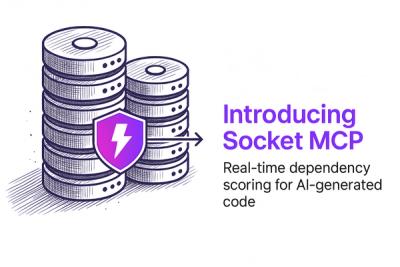
Product
Secure Your AI-Generated Code with Socket MCP
Socket MCP brings real-time security checks to AI-generated code, helping developers catch risky dependencies before they enter the codebase.
mocha-phantomjs-core
Advanced tools
So now that you got your tests Mocha running on a simple flat HTML file, now how do you run them in your CI environment? Karma? what is this karma.conf.js file I have to write? and some background runner task? how do I grep over just a few tests? wait I need a to also install a launcher for phantomjs or slimerjs too? bleck.
Rather than force you to redo your test harness and local development testing, simply run phantomjs mocha-phantomjs-core.js spec tests/mytests.html and be done with it. mocha-phantomjs-core builds on top of what you already have, with no high barrier to entry like Karma.
New in 2.0 is SlimerJS support! There are some bugs still to be worked out, but now you can run your tests headless on the latest firefox version instead of an old QtWebKit!
npm install mocha-phantomjs-core
<phantomjs|slimerjs> mocha-phantomjs-core.js <TESTS> <REPORTER> <CONFIG as JSON>
Examples:
phantomjs ./node_modules/mocha-phantomjs-core/mocha-phantomjs-core.js tests.html
phantomjs ./node_modules/mocha-phantomjs-core/mocha-phantomjs-core.js tests/runner.html xunit > results.xml
/usr/local/bin/phantomjs /path/to/mocha-phantomjs-core.js tests.html spec "{\"useColors\":true}"
Due to resource loading timing issues with external sources, you may need to call initMochaPhantomJS before calling any mocha setup functions like setup(), ui(), etc. mocha-phantomjs-core will notify you if you need this, and if so, add a check for it before your mocha setup code:
if (typeof initMochaPhantomJS === 'function') {
initMochaPhantomJS()
}
This can be avoided by removing unnessecary external resources like fonts, CSS, etc. from your tests, or simply having mocha.js as the first script loaded.
It's best to always refer to the tests for full usage and examples.
reporterOne of mocha's built in reporters, or a full path to a file for a 3rd party reporter (see below on how to write one).
grepa string to pass to mocha.grep() to filter tests. also provide invert: true if you want to invert the grep and filter out tests.
useColorsBoolean. Force or suppress color usage. Defaults to what your terminal supports.
bailBoolean. Stop the test run at the first failure if true. Defaults to false.
ignoreResourceErrorsBoolean. Suppress the resource failure output that mocha-phantomjs-core will output by default.
loadTimeoutTime in milliseconds after the page loads that mocha.run needs to be called. Defaults to 10 seconds.
timeoutSets mocha's root suite timeout. Defers to mocha's default if omitted.
viewportSizeSets the viewport size. Specify height and width, like below:
settingsIf you need to pass additional settings to the phantomjs webpage, you can specify an object of settings here, including common ones like userAgent and loadImages.
phantomjs mocha-phantomjs-core.js dot tests/mytests.html "{\"viewportSize\":{\"width\":720,\"height\":480}}"
Previously mocha-phantomjs required you to look for mochaPhantomJS and then use mochaPhantomJS.run(). That is no longer required. Call mocha.run() as you normally would.
mocha-phantomjs-core supports creating screenshots from your test code. For example, you could write a function like below into your test code.
function takeScreenshot() {
if (window.callPhantom) {
var date = new Date()
var filename = "screenshots/" + date.getTime()
console.log("Taking screenshot " + filename)
callPhantom({'screenshot': filename})
}
}
If you want to generate a screenshot for each test failure you could add the following into your test code.
afterEach(function () {
if (this.currentTest.state == 'failed') {
takeScreenshot()
}
})
mocha-phantomjs-core supports sending events
from your test code to allow for more ouside testing. For example, to trigger an external click event:
if (window.callPhantom) {
window.callPhantom({
sendEvent: ['click', 10, 10] // array of arguments
});
}
viewportSizemocha-phantomjs-core now also supports changing of viewportSize (the simulated window size for the headless browser) - while running tests.
if (window.callPhantom) {
window.callPhantom({
viewportSize : {
width : 100,
height : 100
}
});
}
This comes on particlarly handy when testing for responsiveness.
mocha-phantomjs-core will expose environment variables at mocha.env
Mocha has support for custom 3rd party reporters, and mocha-phantomjs does support 3rd party reporters, but keep in mind - the reporter does not run in Node.js, but in the browser, and node modules can't be required. You need to only use basic, vanilla JavaScript when using third party reporters. However, some things are available:
require: You can only require other reporters, like require('./base') to build off of the BaseReporterexports, module: Export your reporter class as normalprocess: use process.stdout.write preferrably to support the --file option over console.log (see #114)Also, no compilers are supported currently, so please provide plain ECMAScript 5 for your reporters.
npm install
npm test
Travis CI does a matrix build against phantomjs 1.9.7 and 2.0.0, currently. See .travis.yml for the latest.
To debug an individual test, since they are just process forks, you may want to run them directly, like
phantomjs mocha-phantomjs-core.js test/timeout.html spec "{\"timeout\":500}"
Released under the MIT license. Copyright (c) 2015 Ken Collins and Nathan Black.
FAQs
Run client-side mocha tests in phantomjs or slimerjs
The npm package mocha-phantomjs-core receives a total of 4,788 weekly downloads. As such, mocha-phantomjs-core popularity was classified as popular.
We found that mocha-phantomjs-core demonstrated a not healthy version release cadence and project activity because the last version was released a year ago. It has 1 open source maintainer collaborating on the project.
Did you know?

Socket for GitHub automatically highlights issues in each pull request and monitors the health of all your open source dependencies. Discover the contents of your packages and block harmful activity before you install or update your dependencies.

Product
Socket MCP brings real-time security checks to AI-generated code, helping developers catch risky dependencies before they enter the codebase.

Security News
As vulnerability data bottlenecks grow, the federal government is formally investigating NIST’s handling of the National Vulnerability Database.

Research
Security News
Socket’s Threat Research Team has uncovered 60 npm packages using post-install scripts to silently exfiltrate hostnames, IP addresses, DNS servers, and user directories to a Discord-controlled endpoint.